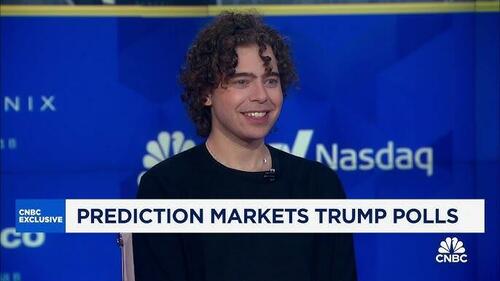The 2024 election was truly a contest between traditional polling and betting markets; so-called nominative opinion polls cast through betting websites such as Peter Thiel-backed Polymarket. and Kalshi, where decentralized groups of individuals were able to wager on various contests in a hyper-efficient free market (notwithstanding regulators' best efforts to limit access).
The day before the election, Bloomberg wrote: Election Gambling Markets Face Their Moment of Truth
The prevailing wisdom on Wall Street is that prediction markets have an edge over polls because participants are economically motivated to incorporate every drip of new information faster. Between a single forecasting model and the wisdom of a crowd that has digested all that information, the latter might reasonably do better.
After the election, the outlet noted that betting markets were thoroughly vindicated after the election - writing: Trump Win Boosts Prediction Markets That Nailed Election Outcome
“These markets will run the world,” said Thomas Peterffy, the billionaire founder of Interactive Brokers. “People tend to say what they want, but in these markets, they will bet the way they think the outcome will occur, not what they want the outcome to be. It takes the emotion out of these questions.”
Perhaps the most notable aspect of this year's betting markets was a French trader who walked away with an estimated $85 million - betting on a Trump win using as 11 accounts on Polymarket.
Polymarket Takes Victory Lap
"Last night, Polymarket proved the wisdom of markets over the polls, the media, and the pundits," Polymarket posted on X, after the platform "Polymarket consistently and accurately forecasted outcomes well ahead of all three, demonstrating the power of high volume, deeply liquid prediction markets like those pioneered by Polymarket."
Last night, Polymarket proved the wisdom of markets over the polls, the media, and the pundits.
— Polymarket (@Polymarket) November 6, 2024
Polymarket consistently and accurately forecasted outcomes well ahead of all three, demonstrating the power of high volume, deeply liquid prediction markets like those pioneered by…
As did Kalshi:
So how about those polls pic.twitter.com/A0YPIAqXW7
— Kalshi (@Kalshi) November 6, 2024
On Thursday, Polymarket CEO Shane Coplan appeared on CNBC, where he explained "I think the thing that people get wrong about Polymarket, the thing I wish people would understand better—and maybe now that they’re more open-minded to it—is that if someone takes a really big position on Trump, for example, there’s someone on the other side, a counterparty. It's all peer-to-peer.
"There’s a big position being taken on Harris. And because of that, when you see the odds on Polymarket, it’s not a function of how much money was put on either side. It’s a function of the market price at that moment. It’s the tightest spread for this market in the world. And I think when you think about it like that, a trade someone made two weeks ago doesn’t have bearing on what the market price is right now. So, all I can say is I understand that it’s a novel concept, and people were skeptical when it came around, but hopefully, people will be more embracing of market-based information."
When host Joe Kernen asked if Polymarket could be manipulated, Coplan replied: "If there’s uninformed flow or price-insensitive flow, people will take that risk. Granted, it’s up to the market to interpret a lot of that flow. If there’s a large influx of flow—whether informed or uninformed—that’s a function of the markets working.
"As we saw this time around, right, this was someone with an infinite bankroll and they didn’t push the market up that much. And they had done a lot of research and had non-consensus information."
"The thing that is undeniable was that on the night of the election, Polymarket was the first destination to basically convey that Trump had won. It was a good two, three hours ahead of the media," Coplan added.
Watch:
In sharp contrast - one of the most highly touted traditional pollsters couldn't have gotten her prediction more wrong that Iowa would go to Kamala Harris, with her call 17 points off.
Like I said, that absurd Selzer/DMR poll in Iowa was an IQ test. https://t.co/jQ5RyjWinQ pic.twitter.com/wjp5xEXqTE
— Sean Davis (@seanmdav) November 6, 2024
Betting markets are better predictors because fan (or polling) biases get corrected by arbitrage. If Bills fans bid up a stat line, it gets adjusted back to reality.
— SpotGamma (@spotgamma) July 23, 2024
Betting markets: Trump 57% vs Kamala 44%
Meanwhile Reuters Poll:
Kamala 44%, Trump 42%https://t.co/h9YbHCqwXx https://t.co/15VWBLmcY9 pic.twitter.com/HDb6GsyR4M
France Freaks
Following the US election, the French National Gaming Authority flipped out and has opened a probe into Polymarket.
"We are familiar with this site and are currently examining its operation and compliance with France's legislation on gambling," said the Authority in a statement.
Polymarket is not authorized to operate in France, and had been "been under French regulators' "radars" since before the U.S. election, said an official familiar with the probe," Politico reports.
The Big Whale, a cryptocurrency news publication, reported Wednesday that the authority was getting ready to ban Polymarket in France. Polymarket declined to respond to POLITICO's request for comment.
While most presidential forecasts had the race between Trump and Kamala Harris as a toss-up, bets on Polymarket showed Trump favored to win, which the now-president elect boasted about on his Truth Social account two weeks before the election. However, in the weeks leading up to the vote, Polymarket consistently showed Harris winning the popular vote, which is now on track to go to Trump as well.
Are they going to ban VPNs too?
Disclosure: In case you couldn't tell from the widget on our homepage, Polymarket is an advertising partner of ZeroHedge.
